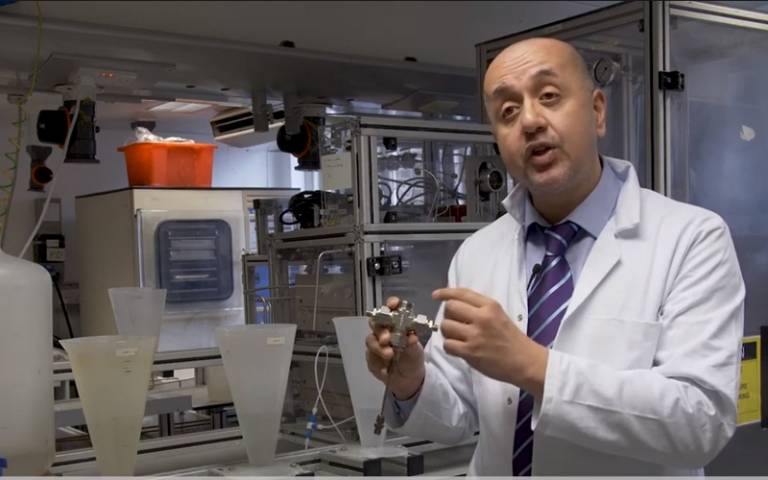Water-based technology helps fuel improvements in car batteries
A ‘green’ technology developed at UCL is providing new materials to improve battery performance that will help to increase the range of electric cars and reduce recharging times.

8 October 2020
Chemists at UCL have developed a high throughput chemical process to produce tiny metal nanoparticles – a thousand times smaller than the width of a human hair – that will help improve technologies as diverse as batteries and healthcare products.
“Our technology uses pure water and small amounts of relatively inexpensive chemicals to produce high-value metal oxide nanoparticles that are useful in products from batteries to sun-creams,” explains Professor Jawwad Darr, Head of UCL’s Clean Materials Technology Group.
“Only a handful of similar reactors exist in the world that provide an energy- and waste-efficient way to make nanoparticles,” he says. The reactor performs a process called continuous hydrothermal flow synthesis, allowing chemists to mix water heated to more than 400 degrees Celsius with metal salts in a controlled way, without the need for organic solvents.
““Only a handful of similar reactors exist in the world that provide an energy- and waste-efficient way to make nanoparticles.”
“What’s different about our system is we’ve added something called a ‘confined jet mixer’ that prevents the reactor from getting blocked as material is generated in the process,” explains Professor Darr. “It is a clean mixer that makes very well-defined particles.”
This adaptation also speeds up nanoparticle production and means new materials can be made in larger quantities, speeding its application in industrial production. Via a UCL consortium called the Juiced Energy Materials Hub Professor Darr and his team are supporting projects across academia and industry to improve battery materials. For example, the team is producing battery materials that make lithium batteries more stable as part of the Faraday Degradation project, led by the University of Cambridge.
The group is also working with a multinational technology company, Qinetiq, to test new nanoparticles that can create batteries that can charge and discharge faster. Such improvements will help extend the range of electric cars and could decrease recharging times.
“Our environmentally friendly technology is bridging the gap between laboratory discovery and industrial-scale production to accelerate sustainable innovation,’ Professor Darr says.
 Close
Close


